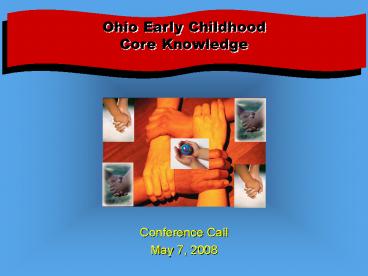Conference Call PowerPoint PPT Presentation
1 / 35
Title: Conference Call
1
Ohio Early Childhood Core Knowledge
- Conference Call
- May 7, 2008
2
Opening Welcome
- Welcome Introductions
- Purpose and Goals
3
Purpose and Goals of Presentation
- Provide updates to significant statewide early
childhood initiatives that support the Core
Knowledge and Competencies Project - Provide a description of the connection between
the Professional Development System and Core
Knowledge and Competencies. - Provide an overview of the Trainer Guide, a
companion piece to Core Knowledge and
Competencies, and other next steps.
4
Making Connections
Governor Stricklands Early Childhood Cabinet
5
Why this matters
6
Imagine
7
PD System Principles
- Provide a continuum of training follow-up
activities - Systematically design, sequence, implement
activities - Embed opportunities for ongoing evaluation
- Build on a clearly articulated philosophical
framework on core knowledge - Tie to a system of licensure, credentialing, or
certification
8
A professional development system is a dynamic
arrangement of interdependent elements
From the National Child Care and
Information and Technical
Assistance Center
9
Ohio Headlines
10
Ohios PD System Efforts
- Professional Development Network
- Compensation Retention
- Training Trainer Approval
- Articulation
- Core Knowledge and Competencies
11
Ohios PD System Efforts
- T.E.A.C.H. Early Childhood Ohio
- Step Up To Quality
- Workforce Study
- Registry
- College Profiles
- Infant Toddler Guidelines
- Preschool Content Standards
- Professional Development Specialists
- Healthy Child Care Ohio
- Afterschool
- First Steps
- Language and Literacy
12
Core Knowledge and Competencies
- Define and discuss the benefits of Core Knowledge
- Describe the components
- Why do we need Core Knowledge Competencies
- How do we use Core Knowledge
- Discuss how Core Knowledge can be used by
professionals
13
At the Core
Core Competencies The range of observable skills
that adults working with young children need to
facilitate child learning development what
adults who work with young children need to be
able to do.
14
Ohios Core Knowledge Areas
- Child Growth Development
- Child Observation Assessment
- Family Community Relations
- Learning Experiences Environments
- Professional Development
- Health, Safety, Nutrition
15
Crosswalking Core Knowledge
- NAEYC Standards for Early Childhood Professional
Preparation - NAEYC Early Childhood Program Standards for
Accreditation Criteria - DEC Recommended Practices in Early
Intervention/Early Childhood Special Ed
16
Alignment of Core Knowledge
- Ohios Early Learning Content Standards State
standards - Ohios Early Learning Program Guidelines
- Ohios Infant Toddler Guidelines
- Ohios Standards for the Teaching Profession
17
8 Guiding Principles
- Create a document that will
- identify key concepts
- universal appeal
- represent knowledge skill
- apply to teachers of children birth to eight
- reflect inclusion
- be culturally sensitive and respectful
- be based on research and expert wisdom
- be reader-friendly and useful
18
Linkage to Career Pathways
- A framework that acknowledges experience,
training and education - Uses a research-based equation to calculate the
level of the professional
19
Career Pathways Levels
- Core Knowledge.........Career Pathways
- Level 1 applies to EC Professional Level 1 2
- Level 2 applies to EC Professional Level 3 4
- Level 3 applies to EC Professional Level 5 6
20
Over-arching Considerations
- Knowledge competencies that cut across all
content areas - support for children with special needs
- diversity and its impact
- factors influencing childrens behavior
21
Early Childhood Professional Dispositions
- Highly valued professional attitudes, beliefs and
perspectives - Related to children, parents families,
coworkers and oneself - Permeate every aspect of professional practice
- Caught rather than taught
22
Uses of Core Knowledge
- Early Childhood Professionals
- Program Administrators
- Developers Providers of Training
- Higher Education
- State Local Agencies
- Early Childhood Advocates
- Parents
23
Core Knowledge Framework
- Rationale
- Knowledge Base
- Competencies
- Levels I, II, III
24
Core Knowledge Area
- Child Growth Development
- Competencies
- Developmental Processes
- Nurturing Relationship
- Appropriate Environments
25
Core Knowledge Area
- Child Observation Assessment
- Competencies
- Foundations Principles
- Gathering Documenting
- Summarizing Interpreting
- Sharing Reporting
26
Core Knowledge Area
- Family Community Relations
- Competencies
- Valuing Families
- Positive Family-Professional Relationships
- Supporting Family Connections
- Community Collaborations
- Impact of Culture, Community and Family
Systems
27
Core Knowledge Area
- Learning Experiences Environments
- Competencies
- Interactions Relationships
- Physical Environments
- Learning Experiences
28
Core Knowledge Area
- Professional Development
- Competencies
- Professionalism in Practice
- Continuous Reflective Professional
Development - Leadership Advocacy
- Ethical Standards Professional Guidelines
29
Core Knowledge Area
- Health, Safety, Nutrition
- Competencies
- Health
- Safety
- Nutrition
30
Other Components of Core Knowledge
- Research References
- Resources
- Linkages
31
Core Knowledge
- Download a copy at www.ohpdnetwork.org
- Multiple copies are available by e-mailing
pd_at_occrra.org or by calling the OCCRRA office at
877-547-6978
32
Core Knowledge Next Steps
- Instructor Guide
- The Instructor Guide will serve as a tool to
help instructors make decisions concerning
categorizing past trainings and planning future
ones. - Focus Group input
- Writing Team process
33
What Now?
Next Steps for Ohio
- 2 4 Year Colleges
- Information Sessions
- Dissemination
- Training
- School Age and Social/Emotional Competencies
- Director Competencies
- Step Up To Quality Sample Professional
Development Plan
34
Thank You
www.ohpdnetwork.org
35
Core Knowledge Competencies
- Im the reason you do this work
Thanks for all you do!

